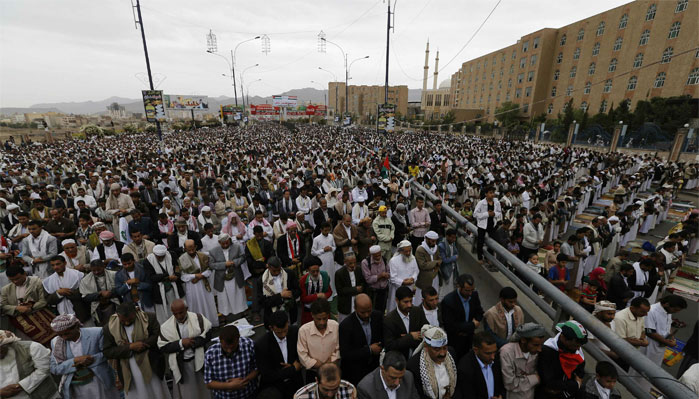People perform prayers during a rally to show solidarity to Gaza, in Sanaa today
Reuters/Gaza
As the United States and regional powers strive for a ceasefire between Israel and Gaza militants, the impoverished enclave faces a daunting recovery, such is the scale of damage after almost three weeks of fighting.
Israeli artillery has shredded entire neighbourhoods and air strikes have pounded the scant infrastructure that barely kept the crowded strip of 1.8 million people running even in peacetime.
In 2012 the United Nations had already recommended urgent action to improve basic services for Gaza's mushrooming population or the place would be uninhabitable by 2020.
This month's fighting can only have made that warning more pressing. At least 2,655 homes have been totally or severely damaged, while another 3,175 are damaged but not beyond use, the U.N. said.
Bombs have lashed 116 schools and 18 health centres, stadiums, playgrounds, mosques, roads, phone towers, water lines, sewage treatment plants and police stations.
The cost of rebuilding Gaza homes destroyed so far in Israeli bombing amounts to $800 million - the whole of Gaza's annual budget - the Palestinian housing minister told Reuters.
Mufeed Al-Hasayna said he could not yet calculate the damage to public buildings or infrastructure, adding that it had received precious little foreign aid to help recovery after past wars.
"We cannot make a definite estimate under fire ... Once the war is over, the ministry plans to call on all the countries of the world to assist in the rebuilding of Gaza," he told Reuters.
"We want real aid and not words. (At the end of another war in 2009) donors promised nearly $5 billion and not a penny arrived. We want real help for Gaza this time," added Husayna, a political independent.
Gaza medics say 816 Palestinians have been killed, most of them civilians, and over 5,000 have been wounded. On the Israeli side, 32 soldiers and three civilians have been killed. But this human tragedy has to compete with others to open the world's purse strings.
The Gaza head of UNRWA, the largest U.N. agency operating there, warned that donors' attention had already been drifting from the seemingly intractable Palestinian-Israeli conflict.
"It's difficult to sustain emergency funding over time. We're victims of the competition, and frankly there's a level of humanitarian need unprecedented in modern history in the world, with the situations in Mali, the Phillipines, South Sudan, Syria and Iraq," Robert Turner told Reuters.
"And we're all competing for the same funds," he said.
Cash is also painfully tight for the Hamas government. An Israeli-Egyptian blockade of the strip led to a $500 million shortfall in its proposed annual budget.
The group, which is blacklisted as a terrorist organisation by its two neighbours and many Western countries, hopes to win the opening of its border crossing with Egypt to goods and people in a truce.

